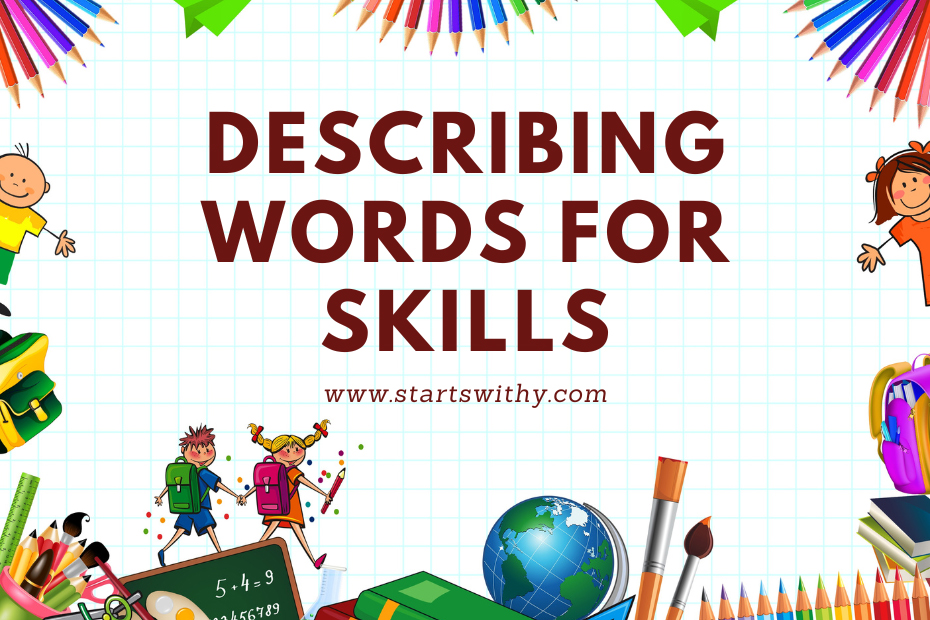Are you looking for the perfect words to describe your skills? Well, you’re in luck! In this article, I’ll be sharing a comprehensive list of adjectives that you can use to showcase your abilities. Whether you’re updating your resume, preparing for an interview, or simply want to express yourself more effectively, having a strong vocabulary of describing words is essential. So, let’s dive in and explore the power of adjectives when it comes to highlighting your skills.
When it comes to describing your skills, using the right adjectives can make all the difference. It’s not enough to simply say you’re “good” at something. Instead, you want to paint a vivid picture of your capabilities. From “innovative” to “analytical,” “detail-oriented” to “results-driven,” we’ll explore a wide range of adjectives that will help you stand out from the crowd. Plus, I’ll provide you with real-life examples to demonstrate how these adjectives can be effectively used in different contexts.
So, if you’re ready to take your skills to the next level and make a lasting impression, let’s get started with our list of adjectives for skills. Whether you’re a seasoned professional or just starting out, these describing words will help you articulate your abilities with confidence and precision. Get ready to enhance your self-presentation and boost your chances of success in any professional setting.
How to Describe skills? – Different Scenarios

When it comes to describing skills, it’s important to tailor your approach to different scenarios. Here are some key tips on how to effectively describe your skills in various contexts:
1. Job Interviews
When interviewing for a job, it’s crucial to highlight your skills in a clear and concise manner. Here’s how to do it:
- Research the job requirements: Before the interview, carefully review the job description to identify the skills that are most relevant to the position.
- Choose specific adjectives: Instead of using generic terms like “skilled” or “experienced,” opt for descriptive adjectives that showcase your capabilities. For example, instead of saying “I am skilled at problem-solving,” you could say “I am an innovative problem solver who thrives in challenging situations.”
- Provide examples: Back up your claims by offering specific examples of how you’ve successfully applied your skills in previous roles or projects. This will demonstrate your competence and make your descriptions more compelling.
2. Resume or CV
Your resume or CV is typically the first impression you make on potential employers, so it’s crucial to effectively describe your skills. Consider the following strategies:
- Tailor your descriptions: Customize your skill descriptions to align with the requirements of the specific job you’re applying for. This will demonstrate that you understand the needs of the role and have the relevant expertise.
- Use action verbs: Start your skill descriptions with strong action verbs to create impact. For instance, instead of saying “Proficient in Microsoft Excel,” you could say “Excelled in data analysis and reporting using Microsoft Excel.”
- Quantify your achievements: Whenever possible, include relevant metrics or numbers to quantify your accomplishments. This helps to validate your claims and give substance to your skill descriptions.
- Be concise: Keep your descriptions brief and to the point. Avoid overwhelming others with an extensive list of skills. Instead, focus on a few key strengths that are most relevant to the conversation.
- Highlight unique qualities: Identify the qualities that set you apart from others and emphasize those in your skill descriptions. This will help you stand out and leave a lasting impression.
- Demonstrate your value: Clearly communicate how your skills can bring value to potential collaborations or partnerships.
Describing Words for skills in English

When it comes to showcasing your skills, using descriptive adjectives can make a big difference in how you present yourself to others. Instead of relying on generic terms, incorporating specific describing words can paint a vivid picture of your capabilities. In this section, I’ll provide you with a list of adjectives that can help you effectively describe your skills, along with examples to demonstrate their usage.
- Innovative: This adjective shows your ability to think outside the box and come up with creative solutions. For example, “I introduced an innovative marketing campaign that resulted in a 20% increase in sales.”
- Analytical: This word highlights your strong problem-solving and critical thinking skills. You can use it to demonstrate your ability to analyze complex situations and make informed decisions. For instance, “I applied my analytical skills to identify inefficiencies in our manufacturing process and implemented changes that improved productivity by 15%.”
- Detail-oriented: Emphasize your meticulous nature and attention to detail by using this adjective. It shows that you have a keen eye for accuracy and can produce high-quality work. For example, “I successfully managed a project by being detail-oriented and ensuring that all tasks were completed with utmost precision.”
- Results-driven: Showcase your focus on achieving goals and delivering tangible outcomes with this descriptive word. Use it to demonstrate how your actions have positively impacted the desired results. For instance, “I spearheaded a sales initiative that resulted in a 30% increase in revenue within six months, showcasing my results-driven mindset.”
- Adaptable: Highlight your ability to adjust to different situations and handle challenges effectively. This adjective demonstrates your flexibility and willingness to embrace change. For example, “I thrived in a fast-paced environment by staying adaptable and quickly adjusting to new priorities.”
These are just a few examples of the many adjectives you can use to describe your skills effectively. Remember, when using describing words, it’s essential to provide specific examples to back them up. This not only gives credibility to your claims but also helps potential employers or colleagues understand the impact of your skills.
Next, I’ll provide you with tips on how to effectively describe your skills during job interviews and on your resume or CV. By implementing these strategies, you can enhance your self-presentation and increase your chances of success in any professional setting. So, let’s dive in and explore these valuable techniques together.
Adjectives for skills

Positive Adjectives for Skills with 12 Example Sentences
When it comes to describing skills, using positive adjectives can help showcase your abilities effectively. Here are some positive adjectives that can highlight your skills and make you stand out:
- Innovative: I am an innovative problem-solver who can think outside the box to find creative solutions.
- Analytical: I have strong analytical skills, allowing me to analyze data and make informed decisions.
- Detail-oriented: I am detail-oriented, ensuring that every task is completed with the utmost precision.
- Results-driven: I am results-driven and always strive to achieve measurable outcomes in my work.
- Adaptable: I am adaptable and can quickly adjust to new challenges and environments.
- Collaborative: I have excellent collaborative skills and enjoy working in a team to achieve common goals.
- Organized: I am highly organized, which helps me manage multiple tasks efficiently.
- Effective communicator: I am an effective communicator, able to convey complex ideas clearly and concisely.
- Leadership: I possess strong leadership skills and can motivate and inspire others to achieve success.
- Flexible: I am flexible and can adapt to changing priorities and deadlines.
- Self-motivated: I am self-motivated and always strive to go above and beyond expectations.
- Proactive: I am proactive in identifying and addressing potential issues before they become problems.
Remember, simply using these adjectives is not enough. It’s essential to provide specific examples or achievements to back them up. By doing so, you can demonstrate your skills with substance and credibility.
Negative Adjectives for Skills with 5 Example Sentences
While it’s crucial to focus on positive attributes when describing your skills, it’s worth knowing some negative adjectives that can be used in certain contexts. Here are a few negative adjectives that might be applicable in specific situations:
- Inflexible: Some skills require a specific approach, and being inflexible can hinder creativity and innovation.
- Impatient: Patience is often necessary, especially when working on complex projects or dealing with challenging situations.
- Disorganized: Lack of organization can lead to missed deadlines and increased stress in the workplace.
- Inefficient: Being inefficient can result in wasted time and resources, affecting overall productivity.
- Unreliable: Reliability is essential in any professional setting, and being perceived as unreliable can damage trust and relationships.
It’s important to note that using negative adjectives to describe skills should be handled with caution. Focus primarily on highlighting your strengths and positive attributes. However, in certain instances, acknowledging areas for improvement can demonstrate self-awareness and a willingness to grow and develop.
Remember, always provide specific examples and relevant experiences when describing your skills, regardless of whether the adjective is positive or negative. This will add credibility and depth to your self-presentation.
Now that we have explored different adjectives for skills, the next section will provide valuable tips on effectively describing your skills in job interviews, resumes, or CVs, aiming to enhance your chances of success in any professional setting.
Synonyms and Antonyms with Example Sentences

Synonyms for skills
When it comes to describing skills, it’s important to have a diverse range of vocabulary at your disposal. This allows you to effectively convey the different aspects of your expertise. Here are some synonyms that can help you add depth and variety to your skill descriptions:
- Proficient: I am proficient in using various software applications.
- Skilled: I am skilled in graphic design and can create visually appealing content.
- Competent: I am competent in managing complex projects and ensuring timely delivery.
- Talented: I have a talent for problem-solving and finding innovative solutions.
- Capable: I am capable of adapting to new technologies and acquiring new skills quickly.
- Gifted: I am gifted in understanding market trends and identifying opportunities.
Antonyms for skills
In certain contexts, it can be helpful to describe what you are not proficient in. This can provide clarity and transparency to potential employers or clients. Here are some antonyms that can be used to highlight areas where you may be seeking improvement or growth:
- Inexperienced: While I am inexperienced in financial analysis, I am eager to learn and develop this skill.
- Novice: As a novice in coding, I am excited to gain more experience and enhance my programming abilities.
- Amateur: Although I am an amateur in public speaking, I have been taking courses to improve my communication skills.
- Unskilled: I am currently unskilled in social media marketing, but I am determined to build my expertise in this area.
- Limited: My knowledge of web development is limited, but I am actively expanding my skills through online courses.
Remember, it’s essential to provide specific examples or achievements to back up these adjectives. Whether you are describing your proficiency or areas for improvement, be sure to highlight relevant experiences that demonstrate your abilities.
Using a combination of synonyms and antonyms can help you effectively describe your skills, showcasing your versatility, and commitment to growth. By implementing these strategies, you can enhance your self-presentation and increase your chances of success in any professional setting.
Conclusion
Describing our skills effectively is crucial in showcasing our abilities and standing out in a competitive professional landscape. Throughout this article, I have discussed the importance of using adjectives to describe skills and provided a range of examples to inspire your own descriptions.
By utilizing synonyms such as “proficient,” “skilled,” and “competent,” we can highlight our expertise and competence in a particular area. On the other hand, antonyms like “inexperienced” and “novice” can help us identify areas for improvement and growth.
Remember, it’s not enough to simply list adjectives. Providing specific examples or achievements that demonstrate our skills is essential for credibility and impact. This combination of synonyms, antonyms, and concrete evidence showcases our versatility and commitment to personal and professional growth.
By effectively describing our skills with adjectives, we enhance our self-presentation and increase our chances of success in any professional setting. So, take the time to carefully choose the right adjectives that accurately represent your skills and accomplishments, and watch as your professional opportunities expand.




